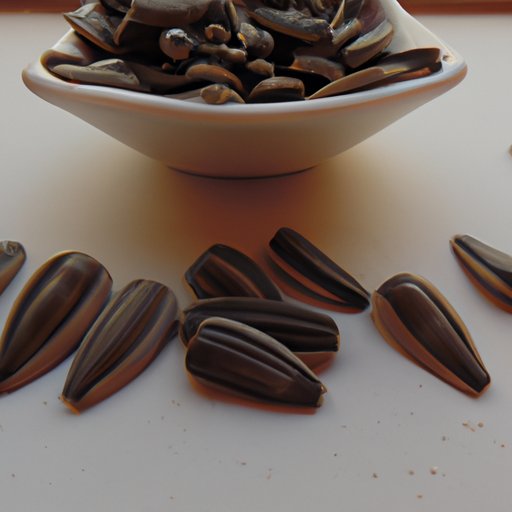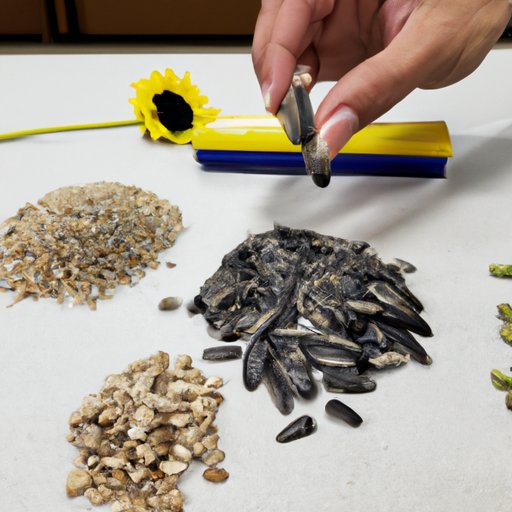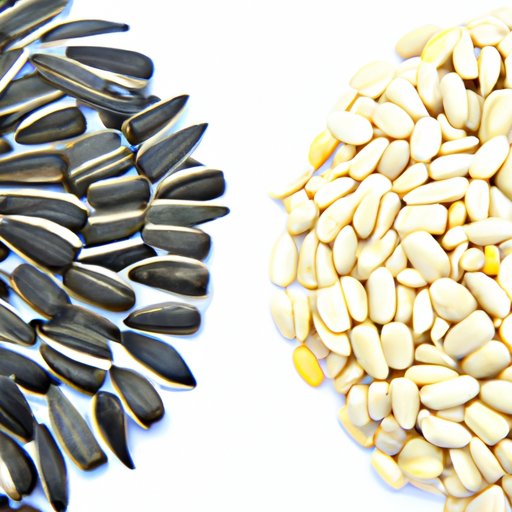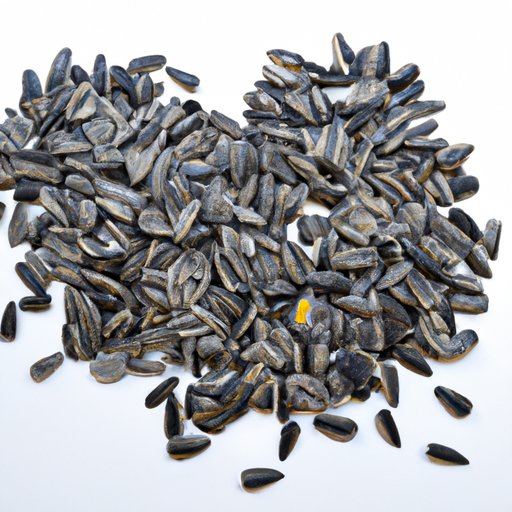Introduction
Sunflower seeds are a popular snack that is often found in trail mixes, salads, and baked goods. But are sunflower seeds good for you? In this article, we will explore the health benefits of sunflower seeds and provide an in-depth look at their nutritional value to help you decide if they should be part of your diet.
What are Sunflower Seeds?
Sunflower seeds are the edible seeds of the sunflower plant, which is native to North America. They have a nutty flavor and crunchy texture and come in a variety of colors, including black, white, gray, red, and striped. Sunflower seeds are rich in nutrients and contain vitamins, minerals, antioxidants, healthy fats, protein, and fiber.
Why Do People Eat Them?
Sunflower seeds are a popular snack because they are tasty and easy to eat. They are also a great source of nutrition and can be added to a variety of dishes, such as salads, granola, and smoothies. Sunflower seeds are also a good source of energy and can help keep you full for longer periods of time. In addition, they are low in calories and high in fiber, making them a great choice for anyone looking to lose weight.
Health Benefits of Sunflower Seeds
Sunflower seeds are a nutritious snack that can provide many health benefits. Here are some of the key nutrients found in sunflower seeds and how they can benefit your health:
Vitamins and Minerals
Sunflower seeds are a good source of several essential vitamins and minerals. They contain vitamin E, which is important for healthy skin, hair, and eyes. They are also a good source of magnesium, which helps regulate blood pressure and supports nerve and muscle function. Additionally, sunflower seeds are a good source of phosphorus, which helps build strong bones and teeth.
Antioxidants
Sunflower seeds are a good source of antioxidants, which can help protect your cells from damage caused by free radicals. Free radicals are molecules that can damage your cells and lead to chronic diseases, such as cancer and heart disease. Some of the antioxidants found in sunflower seeds include phenolic compounds, flavonoids, and lignans.
Healthy Fats
Sunflower seeds are a good source of healthy fats, such as monounsaturated and polyunsaturated fats. These types of fats can help reduce cholesterol levels and lower your risk of heart disease. Sunflower seeds also contain omega-3 fatty acids, which can help reduce inflammation and support brain health.
Protein
Sunflower seeds are a good source of plant-based protein. Protein is important for building and repairing muscle, and it can also help keep you feeling fuller for longer periods of time. One ounce of sunflower seeds contains 5 grams of protein.
Fiber
Sunflower seeds are a good source of dietary fiber, which can help promote digestive health and reduce your risk of certain diseases. Fiber can also help keep you feeling full for longer periods of time and can help prevent constipation. One ounce of sunflower seeds contains 3 grams of fiber.

A Comprehensive Guide to Eating Sunflower Seeds
If you’re considering adding sunflower seeds to your diet, there are a few things you should consider. Here’s a comprehensive guide to help you get started:
Choosing the Right Type of Sunflower Seeds
When shopping for sunflower seeds, you’ll want to make sure you choose the right type. Look for seeds that are raw, unsalted, and organic, if possible. This will ensure that you’re getting the most nutrient-dense product possible.
Understanding Serving Sizes
It’s important to understand serving sizes when it comes to sunflower seeds. A typical serving size is one ounce, or about ¼ cup. Be mindful of how much you’re eating, as too much can lead to weight gain.
Adding Sunflower Seeds to Your Diet
Once you’ve chosen the right type of sunflower seeds and understand serving sizes, you can start adding them to your diet. You can add them to salads, cereal, yogurt, or even just eat them as a snack. You can also try adding them to smoothies or baking them into breads and muffins.

Exploring the Nutritional Value of Sunflower Seeds
Now that you know more about sunflower seeds and how to add them to your diet, let’s take a closer look at their nutritional value. Here’s a breakdown of the macronutrients and micronutrients found in sunflower seeds:
Macronutrients
One ounce of sunflower seeds contains 5 grams of protein, 13 grams of fat, and 4 grams of carbohydrates. It also contains 3 grams of fiber and 1 gram of sugar.
Micronutrients
Sunflower seeds are a good source of several essential vitamins and minerals, including vitamin E, magnesium, phosphorus, potassium, zinc, iron, and selenium. Additionally, they are a good source of antioxidants, such as phenolic compounds, flavonoids, and lignans.
How Sunflower Seeds Improve Your Diet
Eating sunflower seeds can provide numerous health benefits and can help improve your overall diet. Here are a few ways that sunflower seeds can be beneficial:
Weight Loss
Sunflower seeds are low in calories and high in fiber, making them a great choice for anyone looking to lose weight. The fiber helps keep you feeling full for longer periods of time, which can help prevent overeating. Additionally, the healthy fats found in sunflower seeds can help boost your metabolism, which can lead to increased fat burning.
Heart Health
Sunflower seeds are a good source of healthy fats, such as monounsaturated and polyunsaturated fats. These types of fats can help reduce cholesterol levels and lower your risk of heart disease. Additionally, the antioxidants found in sunflower seeds can help protect your cells from damage.
Digestive Health
The fiber found in sunflower seeds can help promote digestive health and can help prevent constipation. Additionally, the antioxidants found in sunflower seeds can help reduce inflammation in the gut, which can help alleviate symptoms of irritable bowel syndrome (IBS).

The Pros and Cons of Sunflower Seeds
Like any food, sunflower seeds have both pros and cons. Here’s a look at the good and bad of eating sunflower seeds:
Pros
- Rich in vitamins and minerals
- Contain antioxidants
- Good source of healthy fats
- High in protein and fiber
- Low in calories
Cons
- High in calories if eaten in large amounts
- May cause digestive issues if eaten in large amounts
- Can be high in sodium if salted
Sunflower Seeds: Superfood or Not?
So, are sunflower seeds a superfood? There’s no definitive answer to this question, as the term “superfood” doesn’t have a scientific definition. However, sunflower seeds can certainly be considered a healthful food due to their nutritional profile. They are a good source of vitamins, minerals, antioxidants, healthy fats, protein, and fiber, all of which can benefit your health.
What Makes a Superfood?
In general, a superfood is a nutrient-dense food that provides numerous health benefits. Generally speaking, superfoods are whole, unprocessed foods that are packed with vitamins, minerals, antioxidants, and other beneficial compounds. They may also contain healthy fats, protein, and fiber.
The Good and Bad of Sunflower Seeds
Overall, sunflower seeds can be considered a healthful food. They are a good source of vitamins, minerals, antioxidants, healthy fats, protein, and fiber. However, they can also be high in calories if eaten in large amounts, so it’s important to watch your portion sizes. Additionally, sunflower seeds may cause digestive issues if eaten in large amounts, and they can be high in sodium if salted.
Conclusion
Sunflower seeds are a popular snack that can provide numerous health benefits. They are a good source of vitamins, minerals, antioxidants, healthy fats, protein, and fiber. Eating sunflower seeds can help promote weight loss, heart health, and digestive health. However, it’s important to watch your portion sizes and choose the right type of sunflower seeds to ensure you’re getting the most nutrient-dense product possible.
(Note: Is this article not meeting your expectations? Do you have knowledge or insights to share? Unlock new opportunities and expand your reach by joining our authors team. Click Registration to join us and share your expertise with our readers.)
